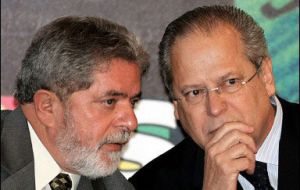MercoPress. South Atlantic News Agency
Brazil corruption money: “between 32 and 53bn dollars in 2013” says FIESP
 Lula da Silva's administration 'mensalao' is an example of the extended corruption in the country's political system
Lula da Silva's administration 'mensalao' is an example of the extended corruption in the country's political system Corruption is not new in Brazil nor does it surprise public opinion but the magnitude of such extended practice is only coming to light with a recent study from the powerful manufacturing lobby, FIESP (Federation of Industries of Sao Paulo State) which states that the average annual cost of corruption in the country is between 1.38% and 2.3% of GDP, which the World Bank in 2012 estimated at 2.3 trillion dollars.
The most recent and notorious case involves the famous 'mensalao' or big monthly payments scheme in which public funds were used to buy political support for the then-Lula da Silva government and to pay off debts from election campaigns. Brazil’s Public Ministry, the country’s Federal Police and the Brazilian Court of Audit estimate that the cash for votes scheme involved an estimated 43 million dollars of taxpayers' money.
If the numbers of the FIESP study are to be believed, just in 2013 something between 32 billion and 53.1 billion dollars can be accounted as “corruption money,” which, it is important to remember, gets out of circulation that hits growth. To put into perspective, if that money was invested in Brazil’s precarious education system, the number of Brazilian students enrolled in elementary school could be improved from its current 34.5 million to 51 million.
Should that money be invested in the public health system, the number of beds available in Brazil’s public hospitals could almost double, from 367.397 to 694.409. That same money could house more than 2.9 million Brazilian families, and if invested in sanitation it could reach an additional 23.3 million households that aren’t on the public sewer system.
As for Brazil’s infrastructure system, one of the country’s Achilles heels, the money diverted from public funds could be used to build 277 new airports in the country, a much needed help considering that it is under scrutiny as it prepares to host the 2014 FIFA World Cup and the 2016 Summer Olympics, with both events requiring advances in airport capacity and efficiency.
According to Transparency International Brazil ranks 43 in the list of most corrupt countries in a scale from 0 to 100 and in which those with less points are the least corrupt ones.




Top Comments
Disclaimer & comment rules-

-

-

Read all commentsFIESP assessments just look at the headline figures for corrupt take-off from public works.
Nov 30th, 2013 - 01:17 pm 0But at every stage of the planning and build process there is skimming - and money set aside to cover it. The money is rarely returned to the pot if the particular phase of the project under-shoots the contingency.
The corrupt take-off is a compound figure that probably massively exceeds the $50 billion that FIESP says is the *accounted-for* figure.
So much corrupt 'take' is now woven into the day to day management of society's activities that it no longer counts as corruption - getting your own goods released from bonded warehouses is just one are with which I am intimately and painfully knowledgeable.
Despachantes operate in all spheres of life http://www.brazilmax.com/columnist.cfm/idcolumn/101
No, this country suffers from a MUCH bigger corruption problem than even the FIESP 'official' figures indicate.
Why is it so hard to keep bandits in Brazil? “ Ou o Brasil derrota as saúvas, ou as saúvas derrotam o Brasil”
Nov 30th, 2013 - 02:29 pm 0This violence is worse than slavery. We have food, we have housing, improved education, have jobs. However, do not leave home. Kidnapping, robbery, theft, gangs, we encounter in our beautiful streets in the South and Southeast of Brazil.
Bras.
Nov 30th, 2013 - 04:25 pm 0You should try it in the North East!
Commenting for this story is now closed.
If you have a Facebook account, become a fan and comment on our Facebook Page!